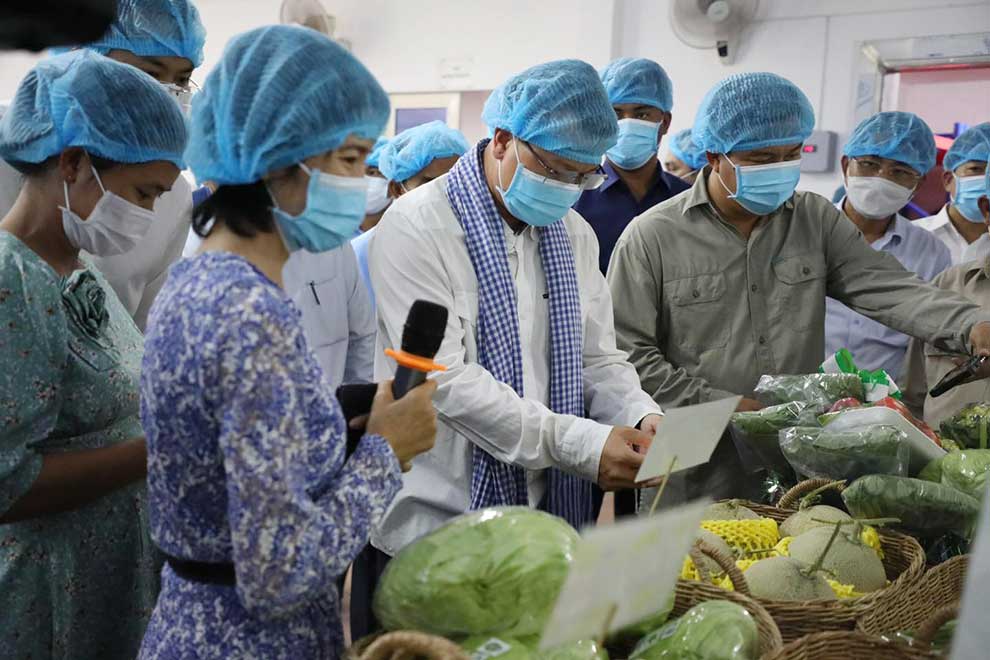
Agriculture minister Dith Tina inspects organic vegetables in Kandal province on November 21. FB
A key future goal of Cambodia is to expand safe vegetable production to meet the growing demand of consumers, according to agriculture minister Dith Tina. To that end, farmers need a clear and accurate planting plan.
“Safe vegetable production requires protective nets, and to help farmers meet this requirement, vegetable wholesalers should be implementing contracts to help producers build these important structures,” he said in a November 21 social media post.
Ministry of Agriculture, Forestry and Fisheries spokeswoman Im Rachana told The Post on November 22 that the ministry runs a centre for the quality control and distribution of safe vegetables in Kandal province’s Takhmao town.
She said the centre plays an important role in supporting and managing the vegetable business cluster, including recording the number and type of vegetables brought there, cleaning, packaging and storing them. The centre also conducts testing for toxins on the vegetables, which were sourced from farming communities in Kandal province, through agricultural contracts.
She added that the minister’s vision of farmers contracting to wholesalers was wise as it would give growers the confidence of having an established market. She said the ministry’s centre is also seeking to cooperate with new partners.
“We should follow the example of local firms Green Gold and NAV, which have attractive packaging and use QR codes to confirm that their vegetables have already been tested to ensure their safety. The codes also include the area they were grown and the names of the farm they came from,” she said.
Rachana said wholesalers should invest in farmers by providing net houses and modern irrigation systems, as this would help mitigate climate change impacts. It is also important that contracts are signed, which guarantee agreed purchase prices for produce, she added.
Chua Makara Chua, chairman of the Cambodia Safety Vegetable Union of Agricultural Cooperative (CSVUAC), welcomed the minister’s statement about the future goal of expanding vegetable production, especially to increase safety. He said it would be a positive step as opportunities for the expansion of cultivation remain limited.
“If the ministry wants to steer the industry in that direction, I will support them. This would provide many farmers with the opportunity to expand their businesses,” he told The Post on November 22.
To that end, Makara said it would require the participation of all stakeholders, including farmers, the private sector and the agricultural ministry.
He pointed out that farmers also need to contribute to the construction of net houses as private businesses could not be expected to build thousands of them.
He acknowledged that at present, there is a shortage in the supply of safe vegetables. Demand could be as high as five or 10 tonnes per day, but currently only 700-800kg was grown in net houses.
“Meeting demand would require the construction of at least 1,000 net houses. Currently, we have less than 10 per cent of that number,” he noted.
Makara said that his union currently has 10 member communities in two provinces: Pailin and Battambang. Some communities have begun collaborative production and some required guidance.
He said the union is currently in talks with other communities in Oddar Meanchey, Banteay Meanchey, Siem Reap, Pursat, Kampong Thom and Kampong Speu provinces, and hopes to roll out its programme next year.
Ly Leang Keu, a farmer in Roka Bos village of Kam Rieng commune and district in Battambang province, said that he has been growing safe vegetable for three years, starting with just one greenhouse from, which he earned one million riel. Gradually, he reached 30 greenhouses, on a hectare of land.
He said growing safe vegetables is very different from the way most simple family plots grew them. Different techniques are employed, and the use of pesticide is more limited.
“When vegetables are grown by a family, they cannot avoid the extensive use of pesticides. But when they are in a greenhouse, the pests do not attack them, so we don’t need to use them often,” he added.
Chorn Kim Sros, a farmer in Por Teab village in M’lou Prey I commune of Preah Vihear’s Chheb district, said he had been growing vegetable using traditional techniques for 20 years. One year ago, he made the change to the new style, and has not looked back.
“I can hardly meet demand! Customers at the provincial market buy out my whole stock as soon as I offer them,” he added.








